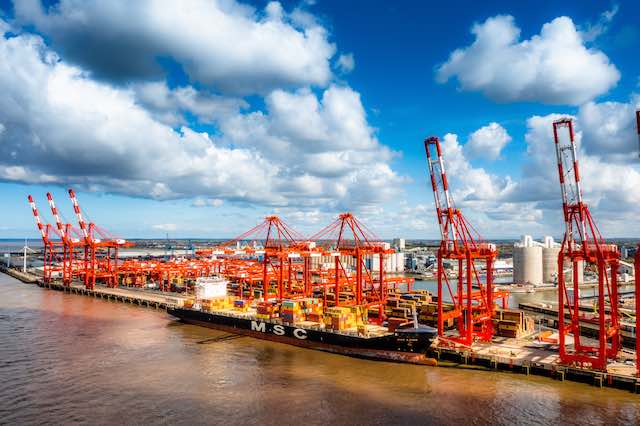
As an island nation, our ports provide critical infrastructure as the UK’s gateways for food, medical, energy and fuel supplies. We have a vital role to play in tackling climate change and the logistics industry must develop a new positive culture to achieve that.
Peel Ports recently committed to becoming a net zero port operator by 2040, ten years ahead of the UK Government’s national decarbonising targets. Ahead of this announcement we set up a new Innovation Forum in July last year to identify innovative and sustainable solutions to help us drive down our carbon footprint. This Forum is committed to tackling the big issues and is made up of senior management and staff working across supply chain, operations, sustainability, and engineering throughout our UK operation.
One of our first moves was to partner with clean technology consultants Carbon Limiting Technologies (CLT) and that work has been vital in helping us try to solve some of the tough questions around emissions reductions. CLT specialises in helping companies choose the best new technology that leads to a reduction in their CO2 outputs or helps to drive their energy transition away from fossil fuels. Our early work with them has included carrying out studies to find a way of exploiting the flow of water in and out of our ports’ docks. We currently have to pump water into our docks to raise the level, and then let the water back out again. Our teams are exploring with CLT if we can find a circular, renewable solution that could use the outgoing water to generate energy to power the pumps for when we needed to raise the water level in the dock again.
The next steps are to take this issue to a range of academic institutions, as well as to engineering and manufacturing companies, and ask them to propose potential options and solutions that we can evaluate, trial and then implement. The hope is that we can dramatically reduce our carbon output involved in running these pumps on diesel.
We are aiming to grow the Forum over the coming months and years and have started inviting academics to our meetings to help support our net zero targets. Third party supplier showcases, demonstrations and trials are due to begin shortly.
The Forum has also recently been in discussions with the Innovate UK Knowledge Transfer Network and became a member of their Decarbonising Ports and Harbours Advisory Group, who will help our drive to become more energy efficient. Information such as this will be key in helping us make informed decisions about clean tech and how we then use it to invest in the best innovation and deploy it at scale.
We have already invested over £1.2 billion over the past decade on sustainable infrastructure and technology but we want to go further. Our teams are currently undergoing trials in the use of greener fuels such as Green D+HVO (hydrotreated vegetable oil), which is a form of renewable diesel replacement, for plant and equipment. It is a biodegradable and sustainable fuel made from 100 per cent renewable raw materials and reduces CO2 levels by up to 90 per cent.
Other moves include our investment in new warehousing, which allows us to collect waste rain and surface water from their roofs to fill up the dock levels. We also recently resurfaced one of our dock estates at the Port of Liverpool with a recycled asphalt called Halo, which saved five tonnes of carbon.
There are further huge opportunities to push sustainability at our Hunterston Port and Resource Centre, which is a former coal terminal in Ayrshire. It is being transformed into an energy and marine campus to support the Blue and Green economies, and all companies we attract to the site will be focused on addressing climate mitigation. The site also has huge potential when it comes to the offshore renewable sector.
As a group we are further investing in and increasing the number of rail connections and multimodal services across our ports to reduce road miles. The average train removes 40 HGV movements in a one-way journey. Ensuring an end-to-end solution and better connectivity across the country must be a priority for the UK government, as well as a potential long-term solution to the driver shortage.
We are committed to long term sustainable growth and plan to make a positive difference to local communities and livelihoods for generations to come.
For more information, visit www.peelports.com